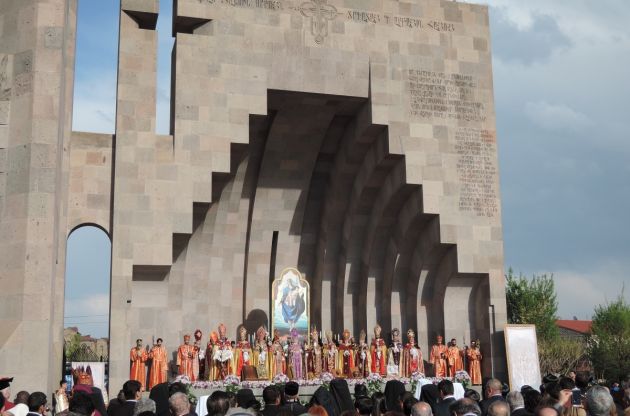Elevation of Syriac bishop 100 years after martyrdom reminder of persecution

Pope Francis has reminded Christians that the severe persecution of believers taking place in the Middle East is not new to the region, despite the degree of intensity.
The pontiff approved a decree Aug. 8 recognizing the martyrdom of Flavien-Michel Malké, a Syriac Catholic bishop killed in 1915 in what is modern day Turkey.
Malké was killed in what Catholic News Agency said was a genocide in the Ottoman Empire's genocide against Christian minorities.
Bishop Malké will be beatified Aug. 29 on the 100th anniversary of his martyrdom, the Holy said.
Separately, on July 31 Pope Francis wrote a letter to Archbishop Maroun Elias Lahham, Auxiliary of Jerusalem for Latins and Patriarchal Vicar for Jordan.
It was the first anniversary of the arrival in Jordan of Iraqi refugees fleeing from the Niniveh Plain, which occurred on August 8, 2014. T
he bearer of the pontifical message was Bishop Nunzio Galantino, General Secretary of the Italian Episcopal Conference, who was in Amman from August 6 to 9 at invitation of Fouad Twal, Patriarch of Jerusalem.
The Pope wrote, "Many times have I wanted to give voice to the the unspeakable, inhuman and inexplicable persecution of those who in many parts of the world — especially among Christians — are victims of fanaticism an intolerance, often under the eyes and in the silence of everyone."
In Lebanon a ceremony will take place for Malké during a liturgy celebrated by Ignatius Youssef III Younan, the Syriac Patriarch of Antioch, at the convent of Our Lady of Deliverance in Lebanon.
Thousands of Syrians and Iraqis displaced by the Islamic State are expected to attend the beatification.
"In these painful times experienced by Christians, especially the Syriac communities in Iraq and Syria, the news of the beatification of one of their martyrs, will surely bring encouragement and consolation to face the today's trials of appalling dimension," said Syriac Patriarchate of Antioch in a statement Aug. 9.
"Blessed Martyr Michael, intercede for us, and protect especially the Christians in the Orient and all the world in these hard and painful days."
OTTOMAN VILLAGE
Malké was born in 1858 in the village of Kalaat Mara, a village of the Ottoman Empire in what is now Turkey, to a Syriac Orthodox family.
He joined a monastery of that Church and was ordained a deacon, but then converted to the Syriac Catholic Church.
Both the Syriac Orthodox and Syriac Catholics use the West Syrian rite.
After his conversion, he was ordained a priest in Aleppo in 1883 and as a member of the Fraternity of St. Ephrem, he served parishes in southeastern Turkey, near his home.
Ottoman persecution of Christians began in earnest with the Hamidian massacres of 1894-1897.
Malké's church and home were burned and destroyed in 1895, and many of his parishioners were slain – including his mother.
In total, the massacres killed between 80,000 and 300,000 Christians.
Selected to become a bishop in the 1890s, Malké served helped rebuild Christian villages.
In 1913 he was consecrated bishop, and appointed head of the Syriac Diocese of Gazireh (modern-day Cizre – 150 miles southeast of Diyarbakir).
A second round of persecution of Christians in the Ottoman Empire began in April 1915.
Known as the Armenian Genocide, it targeted the Armenian, Assyrian, and Greek Christian minorities in the empire.
The Assyrian genocide – the portion of the mass killings directed against Syriac and Chaldean Christians – is also known as the Seyfo massacre, from the Syriac word for sword.
Some 1.5 million Christians are believed to have been killed, and millions more were displaced during the genocide.
Turkey has disputed the number killed and insists it was a genocide, although 28 nations have deemed the killing in Armenia at the time to be so.
When that genocide broke out, Bishop Malké was in the Idil district, near Gazireh. In June 1915, hearing the Ottoman forces were preparing to massacre Gazireh's people he returned.
The Syriac Patriarchate said that when Malké and his friends and acquaintances urged him to withdraw from Gazireh to a safer location, he replied, "Even my blood I will shed for my sheep."
Along with four of his priests and the Chaldean Bishop of Gazireh, Philippe-Jacques Abraham, he was arrested and imprisoned for two months.
He refused to convert to Islam, and on Aug. 29, 1915 he was martyred.